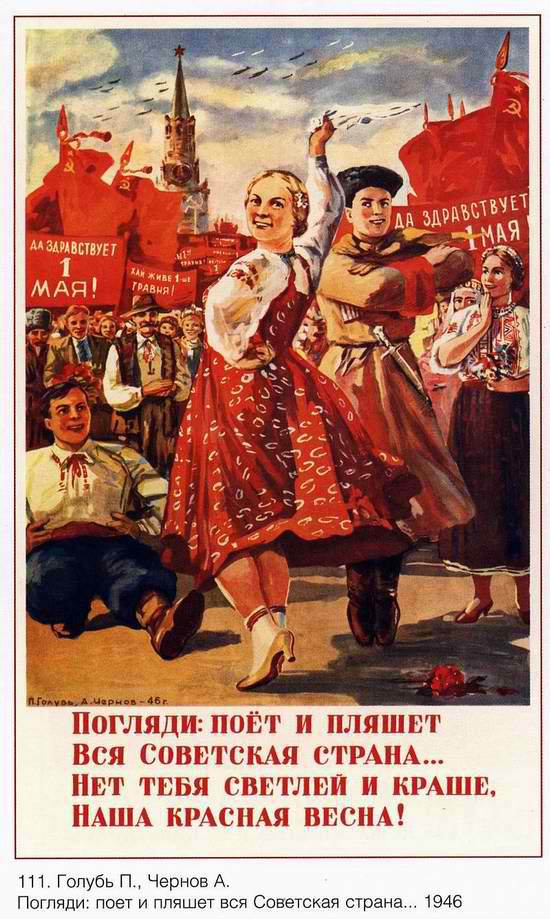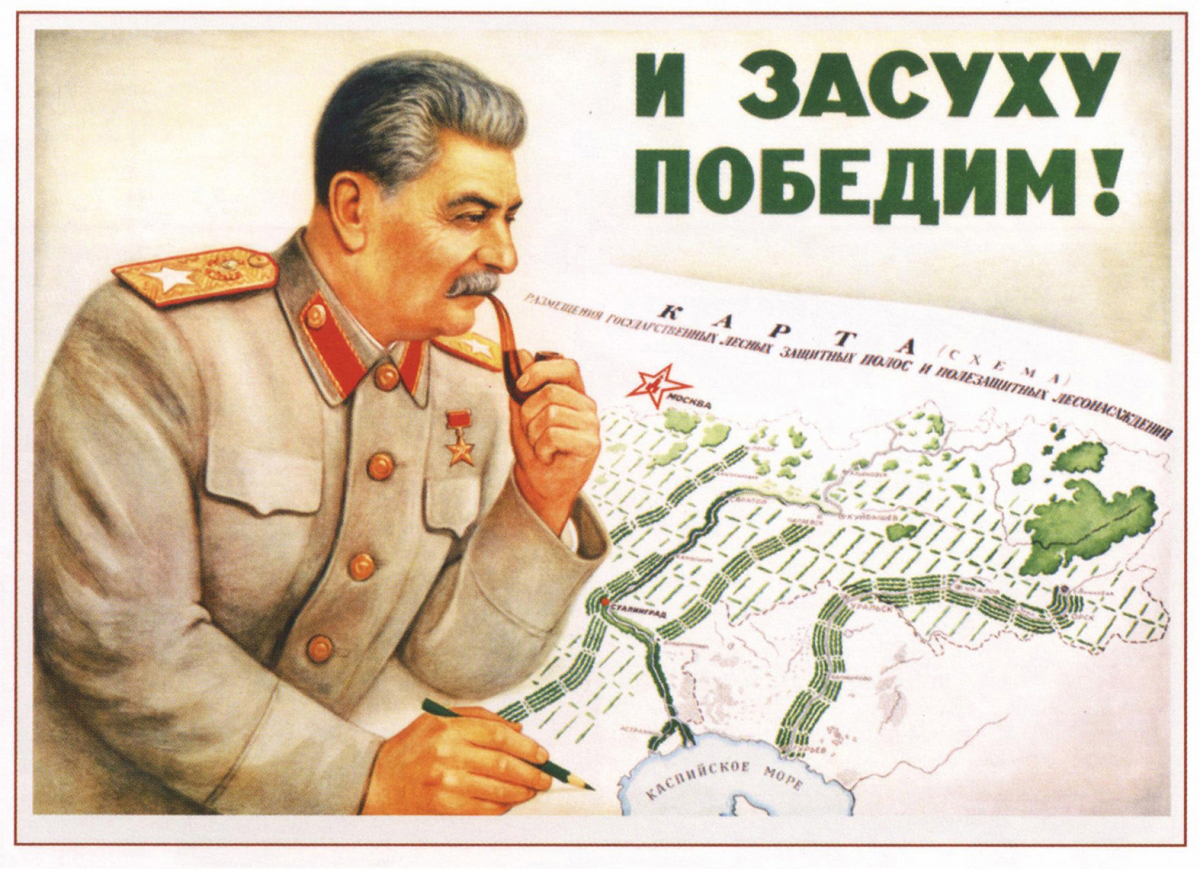
During the years of 1946-1957, the Soviet Union experienced one of it’s three largest famines, after several years of success and happiness seen during the industrial period in the 1930s. The famine happened for a few reasons, though out of the three famines in recent Russian history, this one is the least known about. One of those reasons being because of World War II and the lack of labor. Casualties and the lack of interest to return to the farm after fighting led to less area being cultivated and less man power–which ultimately led to less cultivation of agriculture. Another factor that lead to the famine of 1946-1947 was the drought that occurred in Ukraine which reduced the harvest from an already abysmal harvest as compared to pre-war harvests. Compared to 1940 before the war started, 55 million less tons of grain were harvested in 1946. One of the last large factors in the famine was the role that the state police played. The quotas for grain to the government were still very high–even after the war– making it difficult to have enough food for all.

Tough times like the famine of 1946-1947, led to nostalgia and thoughts of the success had in the 1930s during the industrial boom. This is seen in Sergei Mikhalkov’s “Children’s Verse” (1946), which captured the essence of the good times had in a seemingly joyful series of years in the 1930s. Through patriotism and nostalgia of the better economic times of the 1930s, Mikhalkov attempts to make a terrible time better. Much of this time period (the drought) was spent trying to make the Soviet Union look stable and ok, when in reality it was struggling and going through desperate times.
In the poem, Mikhalkov makes patriotic references to the natural beauty of the country to cover up the tough times. This can be seen in the second stanza of the poem where Mikhalkov writes,”Take a good look all around,/All this is ours, it’s all for us;/ All the mountains and the meadows…/” (Mass Culture in Soviet Russia, 421). This reference to the natural beauty of Russia is used to make the people of Russia appreciative of the little that they have and to make them happy to have something. Other means of patriotism are also used in the poem including in the section under “All This is Ours”, lines 10-14 say, “If in many other countries,/Under foreign governments,/Those who dictate all the laws/Do not plow or sow the fields,/But own the granaries and silos…” (Mass Culture in Soviet Russia, 422). This reference is made to make the Soviet people feel accomplished and proud of the hard work that they put in and that they have something intangible to be proud of. Mikhalkov also comments on the industrial success of the Soviet Union towards the end of the poem where he states, “Everything the factories make,/Everything the plants produce,/ That makes our Motherland so proud…” (Mass Culture in Soviet Russia, 422). This comment to the industrialization pulls on the strings of the success had during an age where industrialization was synonymous with success–in the 1930s. The success allows the reader to become nostalgic about the proud moments and achievements of the Soviet people, which ultimately is what Mikhalkov wants.
The famine of 1946-1947 was a tough time for the Soviet people, but through a number of different means, including poetry, the people of Russia were able to remind themselves of everything they had to be grateful for.
Sources:
Food(or the Lack Thereof) for Thought
Famine of 1946-1947.” Seventeen Moments in Soviet History. N.p., 19 June 2015. Web. 01 Nov. 2015.
Geldern, James Von, and Richard Stites. Mass Culture in Soviet Russia: Tales, Poems, Songs, Movies, Plays, and Folklore, 1917-1953. Bloomington: Indiana UP, 1995. Print.
http://soviethistory.msu.edu/1947-2/famine-of-1946-1947/famine-of-1946-1947-images/#bwg127/734
http://soviethistory.msu.edu/1947-2/famine-of-1946-1947/famine-of-1946-1947-images/#bwg127/732
I guess the nostalgia wasn’t enough to motivate people to attempt to have the times be like they used too. It seems that the drought in Ukraine at the time was something that the Soviet people could not help and contributed to the lack of work and lack of motivation for everyone. Also, I believe another important that led to lack or productivity and depression or nostalgia was the high quotas the government set for crops. These high quotas were often not met, and the constant failure of the meeting those quotas demotivated all the workers and led to them not showing up to work or not working as hard on the job.
It is sometimes difficult to comprehend the effects of losing almost six million people can have on a nation. While this would mean there were fewer mouths to feed, unfortunately there would also be fewer people to feed those mouthes that did remain. It is understandable that the people look back with nostalgia. Here they are, emerging victorious from the greatest war man has ever seen and all they have to show for it is death, destruction and now starvation. It makes it much easy to ignore the flaws of the past and romanticize the leaders that brought on prosperity when one is faced with struggles in the present. This is ever so true for the USSR in this period. Great post and analysis on the difficulties faced by the USSR in this time.
I find it interesting how he uses the nostalgia of the great Russia to inspire people to help improve Russia’s current state. I also never thought of some of the reasons the famine happened. The high of winning a war really does knock off anyone wanting to be agricultural. They had been fighting for over five years. The thought of a normal agricultural life was somewhat foreign due to the long war.
I never really thought about how the loss of life would have affected food production in the postwar USSR. It is really interesting how Mikhalkov used nostalgia to keep the Russian people going during such a hard time. Keeping people’s morale up had to be crucial in overcoming the famine, and it is interesting the way that the task was accomplished. Great post!
its interesting to me that the USSR always turned propaganda to cover its issues instead of actually fixing the root problem. instead of policy change and governmental shift they told everyone that everything was fine and pretended that was the case until it was.
I like the way you juxtapose Mikhalkov’s incredibly optimistic poem against the harsh realities of the postwar famine and hardships. Of course there’s an element of propaganda in the poem, but the nostalgia for real or imagined better times, and hopes of better days to come also served as important morale boosters in the difficult years following the war.